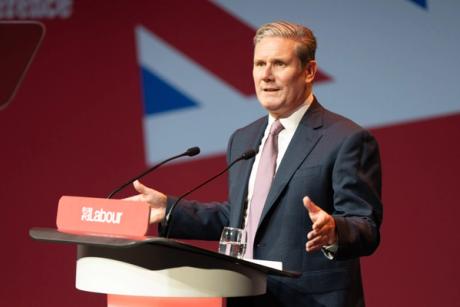
Keir Starmer this morning laid out his vision for the cultural sector under a Labour government, pledging to transform arts access and education across the country and ensure that “creative skills won’t be treated as a luxury, but as a necessity.”
Starmer, who began by talking about his experience playing the flute as a child—taking the train to Victoria “with my flute under my arm”—spoke of how the current Conservative government has “no strategy for the arts”. He spoke of how the party has overseen “a creativity crisis in schools”, with GCSE enrolment in arts subjects dropping by 47% since 2010. Working class children, he added, “bear the brunt of that collapse”.
In a speech that several attendees later grumbled remained “fairly top line”, Starmer did lay out a number of specific plans for the industry. He criticised the English Baccalaureate (EBacc) performance measure, introduced under the Conservative-Liberal Democrat coalition in 2010, which scores students of English literature and language but not arts subjects, and said that Labour would reform the framework surrounding these measures. He also pledged that Labour would change the curriculum “straight away”, so creativity and public speaking skills were “woven into everything our children learn.”
He took a moment to admire the venue in which he stood, the Guildhall School of Music and Drama, pointing out the scientific and engineering skills, as well as the imagination that brought it into being. The arts were too widely seen as a “soft” subject, he said, a middle class “add on”. This would change, “because we know they’re essential to our economic growth and our national identity.”
Apprenticeships in the UK would be transformed, he said, creating a growth and skills levy to help train up young people across the country. Labour would establish new “technical excellence colleges” and a new national body called Skills England. In a policy the party has touted for a number of years, he explained that Labour would abolish unpaid internships, as well as crack down on late payments and “level up” workers rights.
Starmer spoke with pride about the strength of the art market in particular, noting it was the second largest in the world. Referring not only to culture’s importance to the economy but also to the mental health of young people everywhere, he said a Labour government would take art to venues across the country—from libraries and hospitals to shopping centres. Publicly funded museums, meanwhile, will be required to increase the amount they loan their work to public spaces, and step up their engagement with regional museums.
He talked about how the culture wars, which have seen some of the country’s leading institutions—such as the National Trust—lobbied by right-wing activist groups, have become a “war on culture”. Labour, he said, would end that war, and “build a new Britain out of the ashes of the failed Tory project”.
Strikingly, during the Q&A segment, he spoke at length on the importance of using the creative industries as a form of soft power, and a means by which to restore what he said was the UK’s “diminished” standing on the global stage. He went as far as referring to its potential to address global conflict, adding: “I don’t think we’ve lived in such a volatile time globally—we can see that whether it’s the Middle East, Ukraine or other places—and this has the potential to reach across those divides”.
Other policies announced included the creation of a new National Music Education Network, banning ticket touting, and devoting resources to locating spaces in the UK that can be used to support cultural institutions with their work.
Starmer’s speech spurred confidence among a number of attendees, who included some of the leading lights of the sector. Tim Marlow, the director of London’s Design Museum, said: “The point made that art, design and culture are not an add-on but inextricably linked both to the economic life of a country as well as its societal value system, is so obvious but thank god it keeps being made now. The point about getting art and design and creativity back into the curriculum, I’m totally convinced by the importance of it and the fact it can be done quickly.”
Noting that the Design Museum only receives 1% of its turnover from public funding, he adds that “the fact that the cultural economy is going to be reassessed and properly beefed up has to have a benefit to all of us in that sector.”









